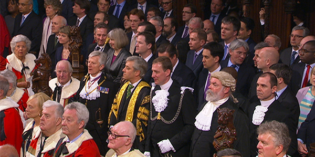Book reviews

Book Review | Council Democracy: Towards a Democratic Socialist Politics edited by James Muldoon
In Council Democracy: Towards a Democratic Socialist Politics, editor James Muldoon brings together contributors to reopen discussion of councilist ideas and movements and to take the scholarship into new realms. While the chapters evidence the continuing tensions within the literature, this is a welcome and important contribution to the revival of this deeply emancipatory form of democratic socialism, writes Babak Amini.

Book Review | The Oxford Handbook of Electoral Systems edited by Erik S Herron, Robert J Pekkanen and Matthew S Shugart
Electoral systems are key components in the operation of representative democracies that vary considerably in their construction, with important consequences for how democracy is implemented. Ron Johnston reviews The Oxford Handbook of Electoral Systems which provides valuable overviews of many of the important topics studied by electoral system scholars, though he wonders about the relative value of such large and expensive volumes aimed at providing ‘state-of-the-art’ surveys and ‘compelling new perspectives’.

Book Review | Europe and Northern Ireland’s Future: Negotiating Brexit’s Unique Case by Mary C. Murphy
In Europe and Northern Ireland’s Future: Negotiating Brexit’s Unique Case, Mary C. Murphy offers a multi-layered account of the consequences of the Brexit referendum vote for Northern Irish politics and the relationship with the European Union. The book’s analysis shows great sensitivity, intellectual rigour and acute understanding, writes Matthew G O’Neill.

Book Review | The Extreme Gone Mainstream: Commercialisation and Far Right Youth Culture in Germany by Cynthia Miller-Idriss
In The Extreme Gone Mainstream: Commercialisation and Far Right Youth Culture, Cynthia Miller-Idriss explores how far-right ideology has infiltrated contemporary mainstream German culture through commercial products that are coded with extremist messages. Using a digital archive containing thousands of historical and contemporary images as well as data from interviews with young people, Miller-Idriss reminds us that while the commercialisation of the far right is not a new phenomenon, it is gaining currency. Katherine Williams recommends this book to readers interested in sociology, history and far-right extremism in its many guises.

Book Review | Making a 21st Century Constitution: Playing Fair in Modern Democracies by Frank Vibert
In Making a 21st Century Constitution: Playing Fair in Modern Democracies, Frank Vibert explores the current state of constitutions, outlining why they have become outdated and suggesting ways in which they can be reworked to better meet the needs of democracies today. While readers may not agree with all of the book’s arguments, it provides interesting insight into how constitutions can overcome their democratic weaknesses and is a welcome addition to this increasing body of scholarship, finds Elyse Wakelin.

Book Review | Municipal Dreams: The Rise and Fall of Council Housing by John Boughton
In Municipal Dreams: The Rise and Fall of Council Housing, John Boughton offers a compelling and grounded biography of council housing in England, enlivened by his deep familiarity with the developments he describes. While more convinced by the historical analysis than the more polemical aspects of the author’s arguments, John P. Houghton finds the book a worthy addition to understandings of council housing.

Book Review | The Political Class: Why It Matters Who Our Politicians Are by Peter Allen
In The Political Class: Why It Matters Who Our Politicians Are, Peter Allen lays out the case for and against the dominance of formal politics by a narrow social group – as well as pointing to the ways we could and should change things. Diverse audiences will find much in Allen’s balanced and thoughtful book, recommends Lawrence McKay, which retains an impressive clarity through its engaging style.

Book Review | How Democracy Ends by David Runciman
Is democracy in crisis? In How Democracy Ends, David Runciman offers a compelling and convincing account of the state of democracy today, separating clear threats from alarmism in an accessible, well-written and thoughtful book. Sean Kippin recommends this to anyone seeking to understand our current predicament and the future paths for democracy – if any – ahead.




 Democratic Audit's core funding is provided by the Joseph Rowntree Charitable Trust. Additional funding is provided by the London School of Economics.
Democratic Audit's core funding is provided by the Joseph Rowntree Charitable Trust. Additional funding is provided by the London School of Economics.